- Clone
- MP4-25D2 (See other available formats)
- Regulatory Status
- RUO
- Other Names
- Interleukin-4, Ia inducing factor (IaIF), B-cell stimulating factor-1 (BSF-1), Hodgkin's cell growth factor (HCGF), Mast cell growth factor-2 (MCGF-2), Macrophage fusion factor (MFF), T cell growth factor-2 (TCGF-2)
- Isotype
- Rat IgG1, κ
- Ave. Rating
- Submit a Review
- Product Citations
- publications

-

PMA/Ionomycin-stimulated human PBMCs were stained with CD3 PE/Cyanine5 and MP4-25D2 PE
| Cat # | Size | Price | Quantity Check Availability | Save | ||
|---|---|---|---|---|---|---|
| 500808 | 25 tests | £65 | ||||
| 500810 | 50 µg | £109 | ||||
IL-4 is a pleiotropic cytokine that is produced by activated T cells, mast cells, and basophils. IL-4 elicits many different biological responses but has two dominant functions. The first is regulating differentiation of naïve CD4+ T cell to the Th2 type. Th2 cells produce IL-4, IL-5, IL-10, and IL-13, which tend to favor a humoral immune response while suppressing a cell-mediated immune response controlled by Th1 cells. The second is regulating IgE and IgG1 production by B cells.
Product DetailsProduct Details
- Verified Reactivity
- Human
- Reported Reactivity
- Pig, Rhesus
- Antibody Type
- Monoclonal
- Host Species
- Rat
- Immunogen
- CHO-expressed, recombinant human IL-4
- Formulation
-
test size: Phosphate-buffered solution, pH 7.2, containing 0.09% sodium azide and BSA (origin USA).
µg size: Phosphate-buffered solution, pH 7.2, containing 0.09% sodium azide. - Preparation
- The antibody was purified by affinity chromatography, and conjugated with PE under optimal conditions.
- Concentration
- µg sizes: 0.2 mg/mLtest sizes: lot-specific (to obtain lot-specific concentration, please enter the lot number in our Concentration and Expiration Lookup or Certificate of Analysis online tools.)
- Storage & Handling
- The antibody solution should be stored undiluted between 2°C and 8°C, and protected from prolonged exposure to light. Do not freeze.
- Application
-
ICFC - Quality tested
- Recommended Usage
-
Each lot of this antibody is quality control tested by intracellular immunofluorescent staining with flow cytometric analysis.
Cat. No. 500808: For flow cytometric staining, the suggested use of this reagent is 5 µl per million cells in 100 µl staining volume or 5 µl per 100 µl of whole blood.
Cat. No. 500810: For flow cytometric staining, the suggested use of this reagent is ≤0.25 µg per million cells in 100 µl volume.
It is recommended that the reagent be titrated for optimal performance for each application. - Excitation Laser
-
Blue Laser (488 nm)
Green Laser (532 nm)/Yellow-Green Laser (561 nm)
- Application Notes
-
ELISA Detection1,3 or ELISPOT Detection4,5: The biotinylated MP4-25D2 antibody is useful as a detection antibody for a sandwich ELISA or ELISPOT assay, when used in conjunction with purified 8D4-8 antibody (Cat. No. 500702/500707) as the capture antibody.
Flow Cytometry6,9: The fluorochrome-labeled MP4-25D2 antibody is useful for intracellular immunofluorescent staining and flow cytometric analysis to identify IL-4 -producing cells within mixed cell populations.
Neutralization1-3: The LEAF™ purified antibody (Endotoxin <0.1 EU/µg, Azide-Free, 0.2 µm filtered) is recommended for neutralization of human IL-4 bioactivity (Cat. No. 500815). The MP4-25D2 antibody can neutralize the bioactivity of natural or recombinant IL-4. -
Application References
(PubMed link indicates BioLegend citation) -
- Chretien I, et al. 1989. J. Immunol. Methods 117:67. (ELISA Detection, Neut)
- Ramanathan L, et al. 1993. Biochem. 32:3549. (Neut)
- Abrams J, et al. 1992. Immunol. Rev. 127:5. (ELISA Detection, Neut)
- Mahanty S, et al. 1992. J. Immunol. 148:3567. (ELISPOT Detection)
- Klinman D, et al. 1994. Curr. Prot. Immunol. John Wiley and Sons New York. Unit 6.19. (ELISPOT Detection)
- Prussin C, et al. 1995. J. Immunol. Methods 188:117. (ICFC)
- Raqib R, et al. 1995. Infect. Immun. 63:289.
- Andersson J, et al. 1994. Immunology 83:16.
- Iwamoto S, et al. 2007. J. Immunol. 179:1449. (ICFC) PubMed
- Kubota M, et al. 1997. J. Immunol. 158:5321.
- Dzhagalov I, et al. 2007. J. Immunol. 178:2113. PubMed
- Kroneke MA, et al. 2012. J. Immunol. 188:3734. PubMed
- Product Citations
-
- RRID
-
AB_315127 (BioLegend Cat. No. 500808)
AB_315127 (BioLegend Cat. No. 500810)
Antigen Details
- Structure
- Cytokine; 15-19 kD (Mammalian)
- Bioactivity
- Differentiation of naïve CD4+ T cells to the TH2 type, proliferation/differentiation of activated B cells, expression of class II MHC antigens, and of low affinity IgE receptors in resting B cells
- Cell Sources
- Mast cells, T cells, bone marrow stromal cells
- Cell Targets
- B cells, T cells, monocytes, endothelial cells, fibroblasts
- Receptors
- Heterodimer IL-4Rα (CD124); γ-subunit (CD132) in common with IL-2R, IL-7R, IL-13R, IL-15R
- Cell Type
- Tregs
- Biology Area
- Cell Biology, Immunology, Neuroinflammation, Neuroscience
- Molecular Family
- Cytokines/Chemokines
- Antigen References
-
1. Fitzgerald K, et al. Eds. 2001. The Cytokine FactsBook. Academic Press San Diego.
2. Boulay J, et al. 1992. Curr. Opin. Immunol. 4:294.
3. Dullens H, et al. 1991. In vivo 5:567.
4. Paul W. 1991. Blood 77:1859. - Regulation
- Upregulated by IL-2, platelet activating factor; downregulated by TGF-β
- Gene ID
- 3565 View all products for this Gene ID
- UniProt
- View information about IL-4 on UniProt.org
Related FAQs
- What type of PE do you use in your conjugates?
- We use R-PE in our conjugates.
Other Formats
View All IL-4 Reagents Request Custom ConjugationCustomers Also Purchased
Compare Data Across All Formats
This data display is provided for general comparisons between formats.
Your actual data may vary due to variations in samples, target cells, instruments and their settings, staining conditions, and other factors.
If you need assistance with selecting the best format contact our expert technical support team.
-
APC anti-human IL-4
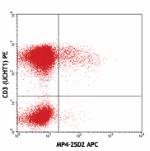
PMA + ionomycin-stimulated (6 hours) human peripheral blood ... -
Biotin anti-human IL-4
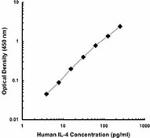
-
FITC anti-human IL-4
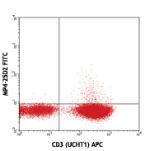
PMA/ionomycin-stimulated (6 hours) human peripheral blood ly... -
PE anti-human IL-4

PMA/Ionomycin-stimulated human PBMCs were stained with CD3 P... -
Purified anti-human IL-4
-
Alexa Fluor® 488 anti-human IL-4
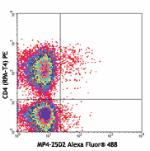
PMA+ionomycin-stimulated (6 hours) human peripheral blood ly... -
Alexa Fluor® 647 anti-human IL-4
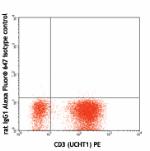
PMA/ionomycin-stimulated (6 hours) human peripheral blood ly... 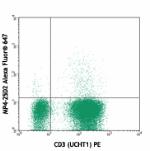
PMA/ionomycin-stimulated (6 hours) human peripheral blood ly... -
Brilliant Violet 421™ anti-human IL-4
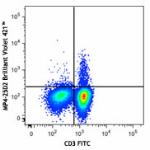
Human peripheral blood lymphocytes were stimulated with PMA ... 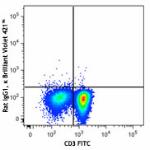
-
PerCP/Cyanine5.5 anti-human IL-4

PMA+ ionomycin-stimulated human peripheral blood lymphocytes... -
PE/Cyanine7 anti-human IL-4

PMA+ionomycin-stimulated (6 hours) human peripheral blood ly... -
Brilliant Violet 605™ anti-human IL-4
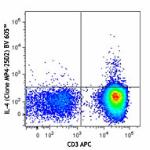
PMA+ ionomycin-stimulated human peripheral blood ... 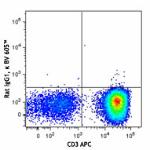
-
Purified anti-human IL-4 (Maxpar® Ready)
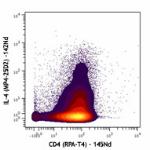
Human Th2-polarized CD4+ T cells were incubated for 5 hours ... 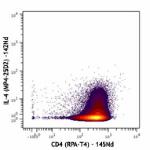
-
PE/Dazzle™ 594 anti-human IL-4
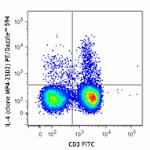
PMA + Ionomycin-stimulated (6 hours) human peripheral blood ... 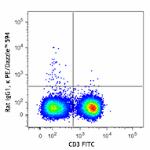
-
APC/Cyanine7 anti-human IL-4

PMA + Ionomycin-stimulated (6 hours) human peripheral blood ... -
Brilliant Violet 510™ anti-human IL-4
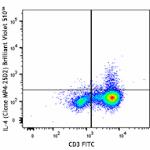
PMA/ionomycin-stimulated (6 hours) human peripheral blood ly... 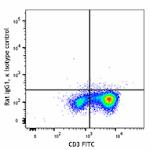
-
Ultra-LEAF™ Purified anti-human IL-4
-
TotalSeq™-B1149 anti-human IL-4
-
PE anti-human IL-4

Typical result of PMA + Ionomycin with Brefeldin A stimulate... -
Brilliant Violet 785™ anti-human IL-4

PMA+ ionomycin stimulated (6 hours) human peripheral blood l... -
Brilliant Violet 711™ anti-human IL-4

PMA+ ionomycin stimulated (6 hours) human peripheral blood l... -
GMP PE anti-human IL-4

Typical result of PMA + Ionomycin with Brefeldin A stimulate... -
TotalSeq™-C1149 anti-human IL-4 Antibody
 Login / Register
Login / Register 













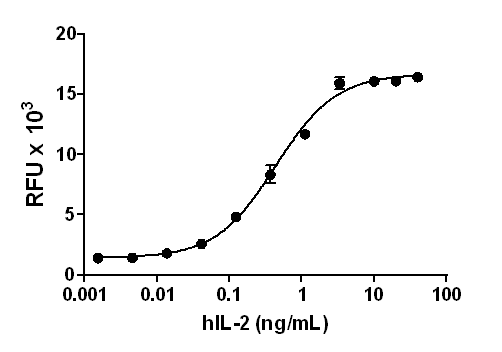
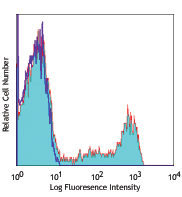



Follow Us